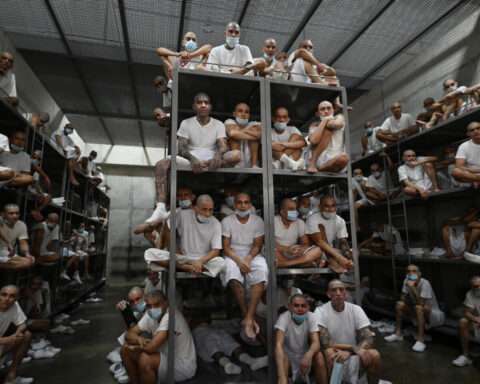A U.S. judge has sharply criticized Trump administration officials for failing to rectify the erroneous deportation of a Maryland man, Kilmar Abrego Garcia, to a notorious Salvadoran prison, sparking outrage and legal battles.
Federal District Judge Paula Xinis issued a scathing rebuke, calling the deportation a “grievous error” that violated U.S. law and demanded Garcia’s immediate return by April 7, 2025. The incident has exposed deep flaws in the administration’s aggressive immigration policies, drawing ire from advocates and igniting a tense standoff between the judiciary and the White House.
As Garcia remains trapped in El Salvador’s Center for the Confinement of Terrorism (Cecot), his family and legal team fight to bring him home, while Trump officials scramble to defend their actions amid accusations of negligence and defiance.
The controversy erupted into public view on April 7, 2025, when Judge Xinis delivered her blistering 22-page opinion, slamming the administration for deporting Garcia “without any lawful authority” and detaining him “without legal basis.”
Garcia, a Salvadoran immigrant married to a U.S. citizen, Jennifer Vasquez Sura, was mistakenly swept up in a mass deportation operation targeting alleged gang members in March. Despite a 2019 immigration judge’s ruling granting him protection from deportation due to risks of persecution in El Salvador, Garcia was arrested on March 12 and sent to Cecot—a mega-prison known for its harsh conditions—on March 15.
The administration has admitted the deportation was an “administrative error,” yet claims it lacks the power to retrieve him, a stance Xinis dismissed as legally untenable.
The Deportation Debacle Unfolds
Garcia’s ordeal began in a Maryland IKEA parking lot, where Immigration and Customs Enforcement (ICE) agents detained him while his five-year-old son watched from the car. A sheet metal apprentice and father of three U.S.-citizen children, Garcia had lived legally in the U.S. with a work permit, shielded by a “withholding of removal” order. This protection stemmed from his credible fear of gang violence in El Salvador, a country he fled in 2011. Yet, on March 15, he was bundled onto a flight with 238 Venezuelans and 23 Salvadorans, part of Trump’s broader push to expel alleged gang members under the rarely invoked 1798 Alien Enemies Act.
The administration justified the operation by labeling deportees as threats, specifically tying Garcia to the MS-13 gang—a claim his lawyers vehemently deny, noting he has no criminal record in any country. White House Press Secretary Karoline Leavitt doubled down, asserting Garcia was a “member of the brutal and vicious MS-13 gang,” though no evidence has been publicly presented. ICE later conceded the deportation was a mistake, but the government’s refusal to act swiftly has left Garcia languishing in Cecot, a facility human rights groups decry for beatings and starvation.
A Judge’s Fury Ignites
Judge Xinis didn’t mince words in her ruling, calling Garcia’s situation a “shocks the conscience” violation of due process. She ordered the Trump administration to return him to the U.S. by midnight on April 7, 2025, a deadline that loomed as the Justice Department filed an emergency appeal to block her order. Xinis accused officials of “confessing grievous error” only to argue they were powerless to fix it, writing, “Having acknowledged they had no legal authority to arrest him, no justification to detain him, and no grounds to send him to El Salvador—let alone deliver him into one of the most dangerous prisons in the Western Hemisphere—defendants now claim this court lacks the power to hear this case.”
The courtroom drama escalated during a Friday hearing when Justice Department lawyer Erez Reuveni admitted he couldn’t explain why Garcia ended up in Cecot, frustrating Xinis further. His lackluster defense prompted Attorney General Pam Bondi to suspend him, insisting DOJ attorneys must “zealously advocate” for the government. Bondi, appearing on Fox News, stood by the MS-13 allegations, though Xinis dismissed them as unsubstantiated in court, noting no arrest warrant or probable cause existed.
US Judge Scolds Trump Officials for Failing to Return Man Deported in Error
The heart of Xinis’ rebuke lies in the administration’s apparent defiance. Despite admitting the error, officials argued they couldn’t compel El Salvador to release Garcia, a position his legal team called “outrageous.” Lawyer Simon Sandoval-Moshenberg told the court, “They’re saying they’ve tried nothing and they’re all out of options,” urging Xinis to force action through diplomacy or financial pressure. The judge agreed, ruling that the government’s inaction didn’t absolve its responsibility for an “illegal act.”
The White House, however, has dug in its heels. Deputy Chief of Staff Stephen Miller labeled Xinis a “Marxist” on X, while Leavitt quipped, “We suggest the Judge contact President [Nayib] Bukele,” implying U.S. courts lack jurisdiction over El Salvador. This rhetoric echoes Trump’s broader attacks on the judiciary, seen earlier when he called for the impeachment of Judge James Boasberg over a separate deportation case. Critics argue this standoff risks a constitutional crisis, pitting executive power against judicial authority.
A Family Torn Apart
For Garcia’s wife, Jennifer Vasquez Sura, the ordeal is a nightmare. “In a blink of an eye, our three children lost their father, and I lost the love of my life,” she said at a Maryland press conference, her voice breaking. She described Garcia as a devoted husband who “pushes everyone around to find their happiness, even in tough times.” Since his deportation, she hasn’t spoken to him, unsure of his condition in Cecot, where footage shows shackled inmates in stark white uniforms. Supporters rallied outside the Greenbelt courthouse, demanding his return and decrying ICE’s overreach.
Immigrant advocates see Garcia’s case as emblematic of Trump’s immigration crackdown, which has ramped up arrests and deportations while sidestepping due process. The use of the Alien Enemies Act—last invoked during World War II—has drawn particular scrutiny, with rights groups alleging it targets migrants, like Garcia, based on flimsy evidence such as tattoos or clothing. A separate federal judge has already blocked its use, though the administration has appealed to the Supreme Court.
Trump’s Defiance and Policy Fallout
President Trump has framed his immigration agenda as a national security imperative, vowing to “get bad people out of our country.” On Truth Social, he called Garcia’s deportation a victory, part of a vetting process to remove “foreign terrorists and illegal criminals.” Border Czar Tom Homan echoed this on Fox News, declaring, “We’re not stopping. I don’t care what the judges think.” Yet, the administration’s missteps have fueled accusations of recklessness, with Garcia’s case spotlighting a pattern of hasty expulsions.
The fallout extends beyond Garcia. The mass deportation operation has stranded hundreds in El Salvador, some allegedly misidentified as gang members. El Salvador’s President Nayib Bukele, who accepted $6 million from the U.S. to house deportees, mocked Xinis’ ruling with a sarcastic “Oopsie… Too late” post on social media. Meanwhile, Democrats and legal experts warn that Trump’s defiance of judicial orders threatens the rule of law, with former Judge John E. Jones III likening it to “inter-branch March Madness.”
What’s Next for Garcia and the Courts?
As the April 7 deadline passed, Garcia’s fate hung in the balance. The Justice Department’s appeal seeks to delay Xinis’ order, arguing that forcing El Salvador to act exceeds U.S. authority and that Garcia’s MS-13 status—disputed though it is—justifies his removal. Legal analysts predict the case could escalate to higher courts, testing Trump’s expansive view of executive power against judicial oversight. For now, Garcia remains in Cecot, his family’s pleas growing more desperate.
The broader implications loom large. If the administration prevails, it could embolden further use of wartime laws to bypass immigration courts, alarming civil liberties advocates. If Xinis’ ruling holds, it may force a reckoning on due process, compelling the government to retrieve Garcia and others wrongly deported. Amid this legal tug-of-war, the human cost mounts—Garcia’s children ask for their father, and a nation watches as justice teeters.
Focus Keywords: US judge scolds Trump officials, man deported in error, Trump immigration policy, Kilmar Abrego Garcia, judicial rebuke






